Geraniums are a popular flowering plant in Australia, thanks to their incredibly low maintenance requirements and abundant flowers. With over 300 species and cultivars available, there is a geranium variety for every garden and every gardener.
This ultimate growing guide for geraniums shares everything you need to know about growing these varied herbaceous perennials in your own garden.
More...
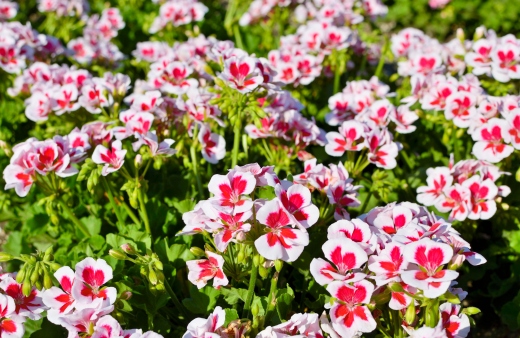
Family: | Geraniaceae |
|---|---|
Genus: | Geranium |
Species: | Various |
Common Names: | Geranium, Cranesbill |
Origin: | Europe, North America, and Asia |
Location: | Outdoors |
Type: | Herbaceous perennial |
Growth: | Varies widely between species |
Sun requirements: | Full sun to part shade |
Foliage Colour: | Green with red and black variegations |
Flower Colour: | Pink, purple, white, and blue |
Flowering: | Spring to autumn |
Edible Parts: | Geraniums produce small, seed-like fruits |
Maintenance level: | Low |
Poisonous for pets: | Not known to be toxic to pets |
What are Geraniums?
Geraniums are a genus of flowering plants in the family Geraniaceae. They are native to temperate regions of the world, including Australia, and are known for their showy flowers and attractive foliage.
Geraniums are commonly referred to as cranesbills, due to the shape of their seed pods.
Natural Habitat of Geraniums
Geraniums are found in a wide range of habitats, from dry deserts to moist woodlands. They are adaptable plants that can grow in a variety of soil types, but they prefer well-draining soil and a moderate amount of sunlight.
Some species grow best in full sun, others in damp shade, so make sure you choose the right type for your garden.
20 Gorgeous Geraniums to Grow in Australia
1. Geranium x cantabrigiense ‘Biokovo’Geranium x cantabrigiense ‘Biokovo’ has pink flowers with white centres and fragrant, evergreen foliage. It grows well when given space to spread on reasonably well drained but rich soil. | 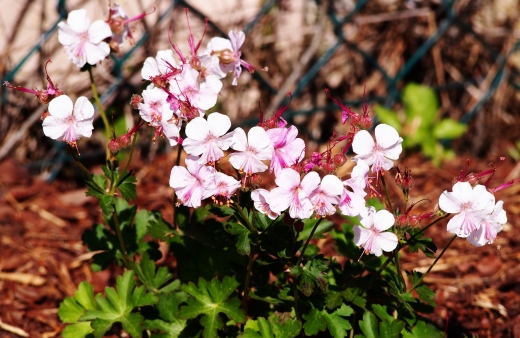 |
2. Geranium x oxonianum ‘Wargrave Pink’A popular geranium cultivar with pale pink flowers and deeply cut leaves. | 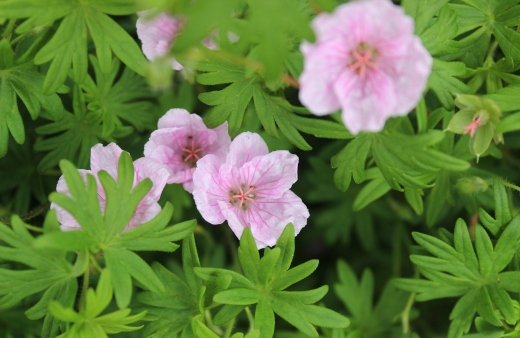 |
3. Geranium ‘Rozanne’Geranium ‘Rozanne’ has large, blue-violet flowers that bloom from early summer to frost. Geranium ‘Rozanne’ is a neat clump-forming geranium, which will grow beautifully at the front of borders, and doesn’t mind a little competition. | 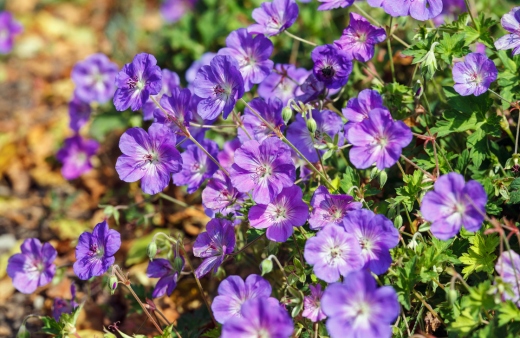 |
4. Geranium sanguineum ‘Max Frei’A low-growing geranium with deep pink flowers and finely divided foliage. This geranium is fully hardy and will come back year after year, filling out further into the border every month through summer, but it's easy to control and divide. | 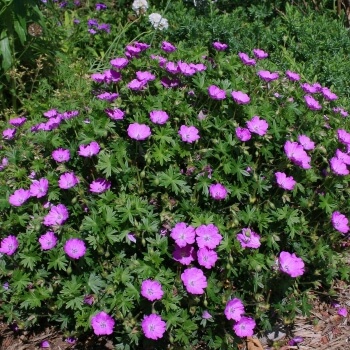 Source: Sandy's Plants |
5. Geranium macrorrhizum ‘Spessart’Geranium macrorrhizum ‘Spessart’ has pink flowers with darker veining and fragrant, glossy leaves. If you’re after winter structure, these gorgeous and gentle geraniums, while not exactly breathtaking in bloom, hold their fragrant foliage right through winter. | 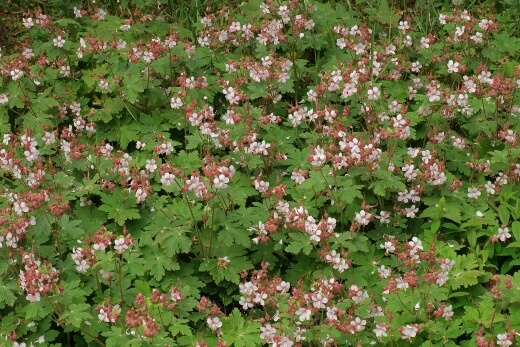 Source: Plant Identification |
6. Geranium nodosumA geranium with pink, star-shaped flowers and deeply lobed leaves. The unusual leaves aren’t typical of geraniums at all, but they add interest, particularly in shady borders and around the base of trees and shrubs. | 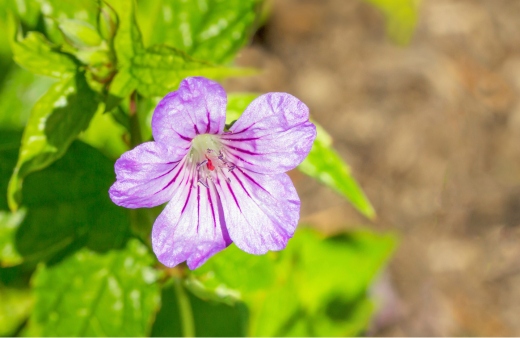 |
7. Geranium phaeum ‘Samobor’A shade-tolerant geranium with dark purple flowers and dissected leaves. Also called dusky cranesbill, these richly coloured flowers are just the tip of the beauty of these neat clump formers, which tend to grow in even circular clumps, and can make a beautiful central feature in lawns. | 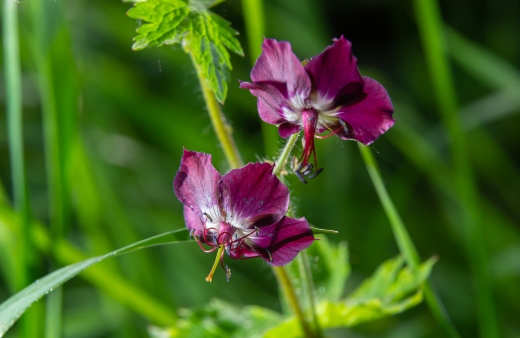 |
8. Geranium pratense ‘Mrs. Kendall Clark’A tall geranium with large, lavender-blue flowers and deeply lobed leaves in some soils, the flowers can open out as lilac, but on neutral and well-drained soils, there’s nothing quite like the translucent blues of Mrs. Kendall Clark. | 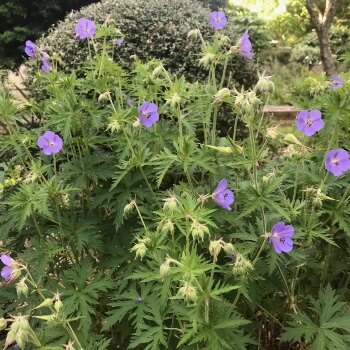 Source: Gentiana Nursery |
9. Geranium psilostemonA striking geranium with magenta flowers and a dark eye define these stunning geranium species, with deeply lobed foliage and flowers that look and feel like crepe paper. | 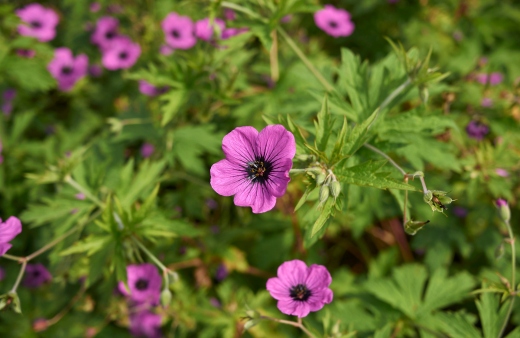 |
10. Geranium renardiiGeranium renardii has soft pink flowers with deep purple veining, and velvety, silver-green leaves. Their leaves are much bigger than most ground-cover geraniums, and hint at their close relationship to scented pelargoniums. | 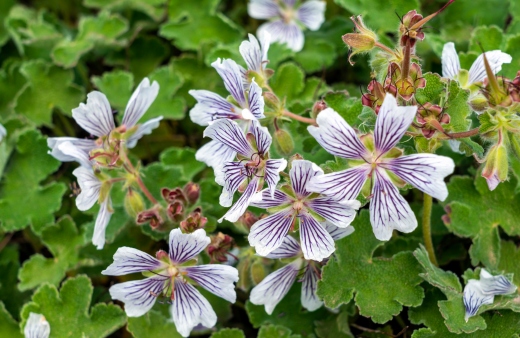 |
11. Geranium ‘Anne Thomson’A geranium with rich pink flowers and deeply divided leaves. Geranium ‘Anne Thompson’ is one of the most popular ornamental geraniums in the world thanks not just to its flowers, but to how easy it is to propagate and divide, making it equally suitable for low maintenance, and high-maintenance gardens. | 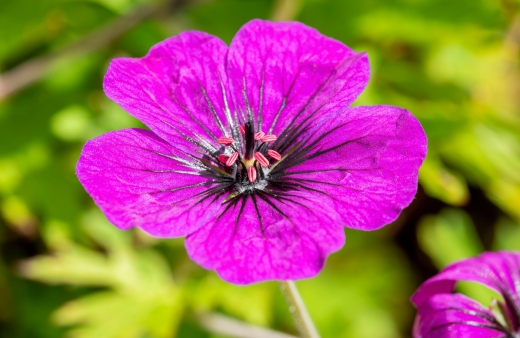 |
12. Geranium endressiiA compact geranium with pale pink flowers and hairy leaves. Geranium endressii is a simple geranium, which flowers steadily through the year. In spring, it tends to flower quite early, but slowly, opening erratically over several weeks, but after cutting back in early summer it will flower vigorously with a carpet of bright pink blooms. | 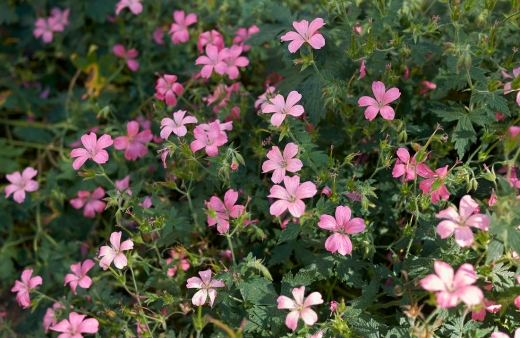 |
13. Geranium himalayense ‘Plenum’A geranium with double, lilac-pink flowers and shiny, dark green leaves. If you’re really trying to show off, then Geranium himalayense ‘Plenum’ is for you. Its gloriously garish double flowers are way beyond anything you would expect from a ground-cover geranium, and it really does earn its keep in ornamental borders. | 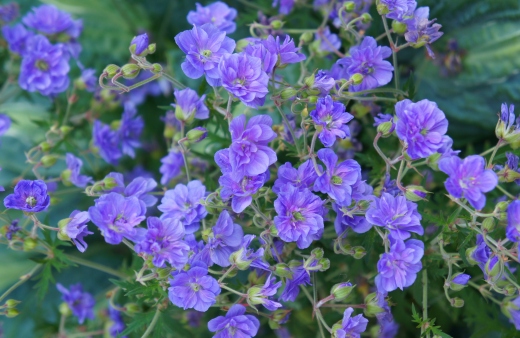 |
14. Geranium pyrenaicum ‘Bill Wallis’A low-growing geranium with bright purple flowers and deeply cut leaves. As the year goes by, Geranium pyrenaicum ‘Bill Wallis’ develops deep red stems, which set off their delicate lilac flowers, which fade as they develop, creating a gorgeous contrast between foliage and flower. | 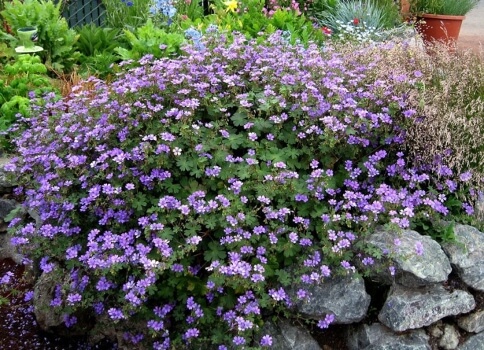 Source: Gardenia.net |
15. Geranium x magnificumGeranium x magnificum has large, violet-blue flowers and glossy, lobed leaves. Its sturdy stems also help to support it in a more upright fashion than most, generally creating a pleasantly tall mound of geranium blooms, reaching about 30-40 cm tall. | 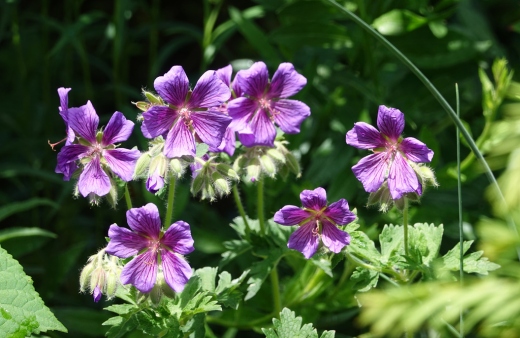 |
16. Geranium ‘Johnson's Blue’A popular geranium with large, sky-blue flowers and deeply divided leaves, Geranium ‘Johnson's Blue’ is a true cranes bill if ever there was one. Its dramatically pointed anthers burst out of five, evenly spaced blue petals, and above lobed but textured foliage that fills beds, borders, or rockeries with ease. | 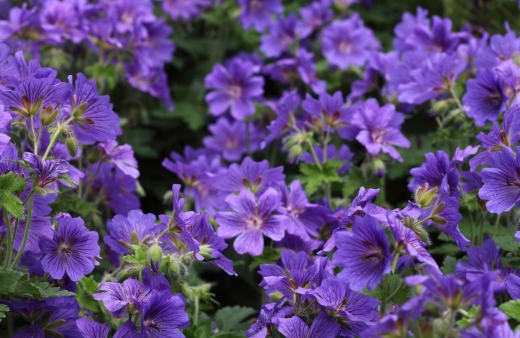 |
17. Geranium maderenseGeranium maderense is, on the face of it, a tall geranium with pink flowers and large, deeply lobed leaves, but my gosh is it more than that! These structural geraniums burst out of the ground like mushroom clouds, sat on top of long red stems, flayed out with flat ground-covering foliage around the base. Then, in spring and early summer, huge clouds of blooms burst out against a backdrop of frothy stems. | 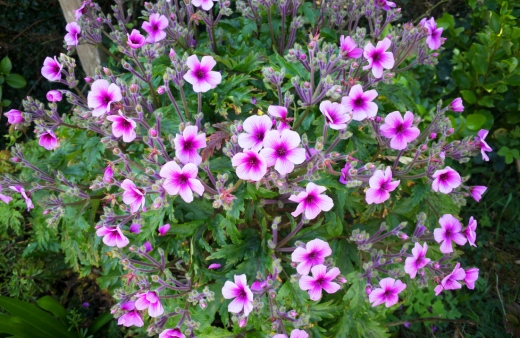 |
18. Geranium ‘Orion’Geranium ‘Orion’ has deep blue flowers and finely divided leaves. If you’re after a reliable ground cover geranium that you can manage easily, then this is it. The gorgeous blue flowers work particularly well against clashing yellows and oranges. | 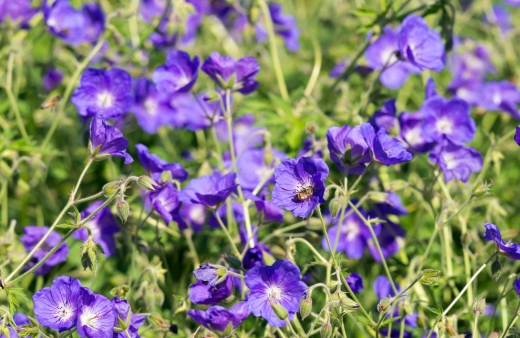 |
19. Geranium x riversleaianum ‘Russell Prichard’A geranium with pale pink flowers and deeply cut leaves. The silvery tinge to the foliage of Geranium x riversleaianum ‘Russell Prichard’ is the perfect backdrop for these pale flowers, which blush out from the even but vast mound of the established plants. | 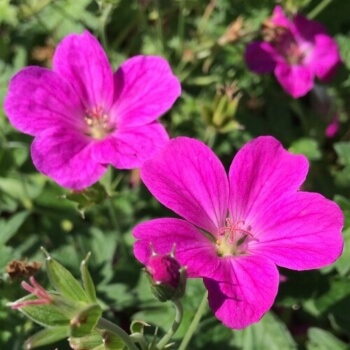 Source: Cranesbill Nursery |
20. Geranium wallichianum ‘Buxton's Variety’A low-growing geranium with bright blue flowers which each have a strikingly clear white centre. Geranium wallichianum ‘Buxton's Variety’ is a highly ornamental cultivar, with tall mounds of foliage, coveted for several months in bold blue flowers. | 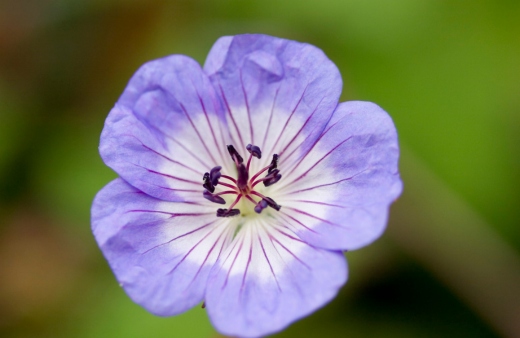 |
20 Gorgeous Geraniums to Grow in Australia
1. Geranium x cantabrigiense ‘Biokovo’

Geranium x cantabrigiense ‘Biokovo’ has pink flowers with white centres and fragrant, evergreen foliage. It grows well when given space to spread on reasonably well drained but rich soil.
2. Geranium x oxonianum ‘Wargrave Pink’

A popular geranium cultivar with pale pink flowers and deeply cut leaves.
3. Geranium ‘Rozanne’

Geranium ‘Rozanne’ has large, blue-violet flowers that bloom from early summer to frost. Geranium ‘Rozanne’ is a neat clump-forming geranium, which will grow beautifully at the front of borders, and doesn’t mind a little competition.
4. Geranium sanguineum ‘Max Frei’

Source: Sandy's Plants
A low-growing geranium with deep pink flowers and finely divided foliage. This geranium is fully hardy and will come back year after year, filling out further into the border every month through summer, but it's easy to control and divide.
5. Geranium macrorrhizum ‘Spessart’

Source: Plant Identification
Geranium macrorrhizum ‘Spessart’ has pink flowers with darker veining and fragrant, glossy leaves. If you’re after winter structure, these gorgeous and gentle geraniums, while not exactly breathtaking in bloom, hold their fragrant foliage right through winter.
6. Geranium nodosum

A geranium with pink, star-shaped flowers and deeply lobed leaves. The unusual leaves aren’t typical of geraniums at all, but they add interest, particularly in shady borders and around the base of trees and shrubs.


Get Your Free Guide:
Master Growing Australian Natives eBook
A Must Have Complete Guide for Every Australian Garden
Get Your Free Guide:
Master Growing Australian Natives eBook
A Must Have Complete Guide for Every Australian Garden
7. Geranium phaeum ‘Samobor’

A shade-tolerant geranium with dark purple flowers and dissected leaves. Also called dusky cranesbill, these richly coloured flowers are just the tip of the beauty of these neat clump formers, which tend to grow in even circular clumps, and can make a beautiful central feature in lawns.
8. Geranium pratense ‘Mrs. Kendall Clark’

Source: Gentiana Nursery
A tall geranium with large, lavender-blue flowers and deeply lobed leaves in some soils, the flowers can open out as lilac, but on neutral and well-drained soils, there’s nothing quite like the translucent blues of Mrs. Kendall Clark.
9. Geranium psilostemon

A striking geranium with magenta flowers and a dark eye define these stunning geranium species, with deeply lobed foliage and flowers that look and feel like crepe paper.
10. Geranium renardii

Geranium renardii has soft pink flowers with deep purple veining, and velvety, silver-green leaves. Their leaves are much bigger than most ground-cover geraniums, and hint at their close relationship to scented pelargoniums.
11. Geranium ‘Anne Thomson’

A geranium with rich pink flowers and deeply divided leaves. Geranium ‘Anne Thompson’ is one of the most popular ornamental geraniums in the world thanks not just to its flowers, but to how easy it is to propagate and divide, making it equally suitable for low maintenance, and high-maintenance gardens.
12. Geranium endressii

A compact geranium with pale pink flowers and hairy leaves. Geranium endressii is a simple geranium, which flowers steadily through the year. In spring, it tends to flower quite early, but slowly, opening erratically over several weeks, but after cutting back in early summer it will flower vigorously with a carpet of bright pink blooms.
13. Geranium himalayense ‘Plenum’

A geranium with double, lilac-pink flowers and shiny, dark green leaves. If you’re really trying to show off, then Geranium himalayense ‘Plenum’ is for you.
Its gloriously garish double flowers are way beyond anything you would expect from a ground-cover geranium, and it really does earn its keep in ornamental borders.
14. Geranium pyrenaicum ‘Bill Wallis’

Source: Gardenia.net
A low-growing geranium with bright purple flowers and deeply cut leaves. As the year goes by, Geranium pyrenaicum ‘Bill Wallis’ develops deep red stems, which set off their delicate lilac flowers, which fade as they develop, creating a gorgeous contrast between foliage and flower.
15. Geranium x magnificum

Geranium x magnificum has large, violet-blue flowers and glossy, lobed leaves. Its sturdy stems also help to support it in a more upright fashion than most, generally creating a pleasantly tall mound of geranium blooms, reaching about 30-40 cm tall.
16. Geranium ‘Johnson's Blue’

A popular geranium with large, sky-blue flowers and deeply divided leaves, Geranium ‘Johnson's Blue’ is a true cranes bill if ever there was one. Its dramatically pointed anthers burst out of five, evenly spaced blue petals, and above lobed but textured foliage that fills beds, borders, or rockeries with ease.
17. Geranium maderense

Geranium maderense is, on the face of it, a tall geranium with pink flowers and large, deeply lobed leaves, but my gosh is it more than that! These structural geraniums burst out of the ground like mushroom clouds, sat on top of long red stems, flayed out with flat ground-covering foliage around the base.
Then, in spring and early summer, huge clouds of blooms burst out against a backdrop of frothy stems.
18. Geranium ‘Orion’

Geranium ‘Orion’ has deep blue flowers and finely divided leaves. If you’re after a reliable ground cover geranium that you can manage easily, then this is it. The gorgeous blue flowers work particularly well against clashing yellows and oranges.
19. Geranium x riversleaianum ‘Russell Prichard’

Source: Cranesbill Nursery
A geranium with pale pink flowers and deeply cut leaves. The silvery tinge to the foliage of Geranium x riversleaianum ‘Russell Prichard’ is the perfect backdrop for these pale flowers, which blush out from the even but vast mound of the established plants.
20. Geranium wallichianum ‘Buxton's Variety’

A low-growing geranium with bright blue flowers which each have a strikingly clear white centre. Geranium wallichianum ‘Buxton's Variety’ is a highly ornamental cultivar, with tall mounds of foliage, coveted for several months in bold blue flowers.
How to Grow Geraniums in Australia
When it comes to growing geraniums, it's important to choose the right location and soil type. Geraniums generally prefer well-drained soil with slightly acidic conditions.
They also require full sun to partial shade, depending on the species, but most will be happy anywhere other than full shade.
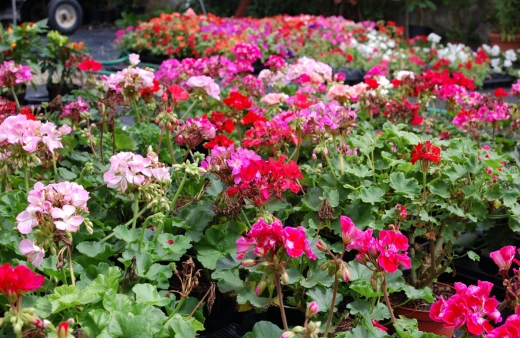
Best Conditions for Planting Geraniums
Geraniums are tough plants, even when they’re young, so you can’t really go wrong when planting them. However, if you truly want them to thrive, dig a generous hole (twice the size of their root ball) and mix compost back in with the earth before planting (about 50/50 is perfect).
After that, simply drop the root ball into the hole, at the same level it was in the pot, and firm it in. Then drench the newly planted geranium, and wait until it starts to flower in late spring.
Soil & Drainage
Geraniums prefer well-drained but rich soil, as they are susceptible to root rot in wet conditions. If you have heavy clay soil, it's a good idea to add compost or other organic matter to improve drainage, or even horticultural grit for a more permanent solution.
Alternatively, you can grow geraniums in raised beds or containers filled with any well-drained potting mix.
Light requirements
Most geraniums require full sun to part shade, although some species can tolerate more shade than others. If you're growing geraniums in containers, it's a good idea to move them around every few weeks in their first year to find the best location, as they will quickly respond to changing conditions, and let you know when they’re happy.
Growing Geraniums in Pots
Geraniums are well-suited for container gardening, as they are relatively compact and can be moved around to find the best growing conditions. To get started, find a suitable container, and then follow the steps below:
- Choose a container with drainage holes and fill it with a rich but well-drained potting mix (I use garden compost mixed 50/50 with sieved garden soil, and line the base of the pot with pea gravel).
- Plant the geranium at the same level it was in the nursery pot, with the top of the root ball level with the soil surface.
- Water thoroughly after planting and keep the soil moist until the plant is established.
- Fertilise with a balanced liquid feed once a month during the growing season.
- Prune the plant in late winter or early spring to encourage bushy growth and more flowers.
- In late spring or early summer, when the first flush of flowers has finished, cut the plant back hard to encourage a full second flush of foliage and flowers.
How to Propagate Geraniums
Geraniums can be propagated from seed, cuttings, or division, and each is as simple as the last.
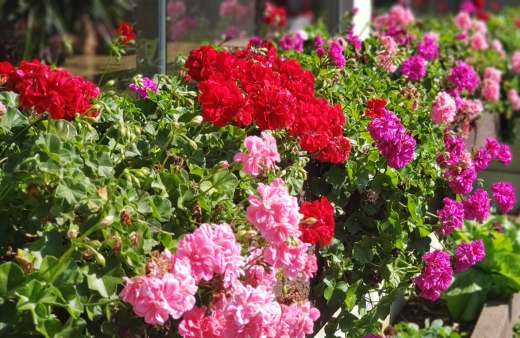
Geranium Propagation from Seeds
Geraniums will naturally spread in the garden from seed, and produce abundant seeds from pointed pods at the end of their flowering season. If you’re not confident about saving your own seeds though, you can buy packs of geranium seeds relatively cheaply online, or at your local garden centre.
- Sow geranium seeds in early spring, either indoors or directly in the garden.
- Cover them lightly with soil and keep the soil moist until the seeds germinate (2-3 weeks).
- Transplant seedlings to their final location once they have developed several sets of leaves, and are about 3” tall.
Propagating Geraniums from Cuttings
Geraniums make great plants for cuttings, and are a wonderful way to practise taking cuttings if you’re new to it. All you need is a good pair of clean, sharp secateurs, and some really well-drained potting mix (sieved garden soil and perlite is ideal).
- Take cuttings from a healthy geranium plant in spring or summer.
- Cut 10-15 cm of a non-flowering stem, just below a node, with two leaf nodes above the cut point.
- Strip the lowest leaf off.
- Dip the cut end in rooting hormone and place it in a pot filled with a well-drained potting mix.
- Water thoroughly and keep the soil moist until the cutting has rooted.
- Transplant the cutting to its final location once it has developed a good root system.
Propagating Geraniums from Division
By far the easiest way to create new geranium plants is to divide existing ones. And for clumsy gardeners, you really can’t go wrong as these tough plants are capable of withstanding a serious battering if you do it at the right time of year.
- Dig up an established clump of geranium in early spring.
- Use your spade to split it down the middle, and do this as many times as possible to create 10-20 cm clumps.
- Immediately replant each clump back into the garden, or into pots.
- In a few months, they’ll have completely recovered and you’ll have loads of new geraniums dotted around the garden.
Caring for Geraniums
Geraniums are low-maintenance plants, but an annual spring mulch will help to keep weeds down and give them all the food they need.
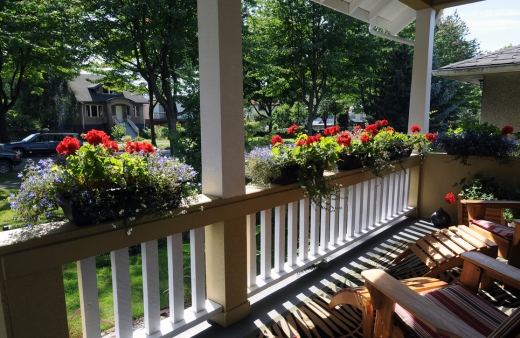
Mulching Geraniums
Mulching geraniums can help to retain moisture in the soil and keep weeds at bay. Mulching around the base of geraniums with rotted manure in spring will provide all the food they need for the year ahead.
Water Requirements
Geraniums are drought-tolerant plants, but for those in pots, they do need watering at least once a week to help them to flower more effectively. The soil should be kept consistently moist, but not waterlogged.
During the hot summer months, you may need to water your geraniums more frequently to keep the soil moist, but in cooler regions, geraniums planted in borders will barely need water at all as rain will usually be enough.
Repotting and Pruning Geraniums
Pruning your geraniums is an important part of their care. Regular pruning will help to promote bushier growth and more blooms. For geranium seedlings or cuttings, pinch out growing tips to encourage more lateral growth and more flowers.
For established geraniums, it's best to prune hard in the spring, just before new growth begins. Cut back any dead or damaged stems, and trim back the remaining stems by about half their length.
Repotting your geraniums is also important to keep them healthy and thriving. Geraniums should be repotted every 2-3 years, or when they outgrow their current pot.
When repotting, use a well-draining potting mix and a container that is one size larger than the current one, or follow the steps earlier in this guide for diving to keep them in the same pot year after year.
Geranium Pests and Diseases
Geraniums are generally quite hardy and resistant to pests and diseases. Whiteflies, aphids, and spider mites have been known to attack geraniums, but in twenty-something years of rowing geraniums, I’ve never had a single pest problem.
Diseases, however, particularly those related to overwatering, are quite common:
Leaf spot
This fungal disease causes small brown spots on the leaves of geraniums. Remove infected leaves and treat the ruminating foliage with an organic fungicide.
One problem with detecting leaf spot is that it is usually lower down in the plant, and can be covered by healthy growth, so inspect geraniums regularly and cut out any affected or diseased growth as soon as you see it.
Crown rot
Crown rot is a bacterial disease that can cause the base of the plant to rot. Key signs are wilting foliage, but the only real way to treat it is to remove the affected plant and burn it to prevent the spread of the disease.
Powdery mildew
Powdery mildew is a fungal disease that causes a white powdery coating on the leaves of geraniums, and is particularly common, especially in humid areas, or when you water using sprinkler systems.
The fungus spreads as spores and is attached to damp foliage in warm conditions. Remove infected leaves and treat the plant with fungicide.
Geranium Frequently Asked Questions
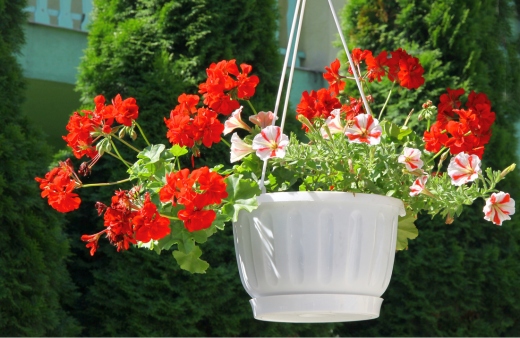
When is the best time to plant geraniums?
Geraniums can be planted in the spring or autumn. In cooler areas, it's best to plant in the spring after the last frost as young plants can be quite tender if their roots are exposed to cold, wet, or frost conditions before they begin growing in spring.
How often should I water my geraniums?
Geraniums should be watered regularly to keep the soil moist, but not waterlogged. During the hot summer months, you may need to water them twice a week, but geraniums in beds and borders rarely need to be watered more than once a fortnight.
Do geraniums attract bees?
Geraniums are incredibly attractive to bees and other pollinators as their abundant flowers provide nectar through the start of the growing season, which is as attractive to bees as it is to us.
Wrapping Up Our Geranium Growing and Caring Guide
Geraniums are stunning border plants but can look just as good in pots or hanging baskets. From subtle native varieties to the more vibrant hybrids, there are geraniums to suit every garden, and every aspect.
These versatile and easy-to-grow plants add colour and interest to your garden, and with just a little bit of care and attention, they will reward you with beautiful and plentiful flowers right throughout the spring and summer.
Published on May 13, 2023 by Maisie Blevins
Last Updated on February 23, 2024

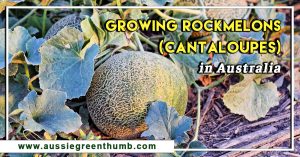



Gooday folks,
I am a retired oldie and a geranium hobbyist with over 120 varieties.
I have regularly grown geraniums and pelargoniums from seed with great success, however have recently got stymied.
I recently purchased some seeds from China which I am unable to germinate. They are a far larger and tougher, dark coated seed than I have usually encountered.
I planted them in seed raising mix, placed them in an insulated box with a plant heating pad and a clear perspex cover. Heat set at 25c and kept moist, but nil result after a month.
Second attempt as per previous effort but following 48 hours soaking in warm water. Again no result.
Third time, rubbed lightly on sandpaper until dark outer cover showed as beige, soaked in warm water and planted, again with recommended temperature and moisture, but still no sign of germination.
I have used this same pattern to germinate geraniums of many varieties in the past and generally found high germination rates within 4 – 7 days.
Can you possibly offer any other means of production that I am not aware, even after studying all the outlets on internet that I have discovered ??????
Many thanks and regards,
Marty
Hi Marty,
I’ll get the first and obvious question out the way – are they definitely Geranium seeds? I’ve bought plenty of exciting seeds from China and been lumped with something entirely different (we once bought some heirloom tomato seed and got sent a pack of cherry pits!!)
I think you’re probably more of a geranium pro than me with 120 varieties. I’m impressed.
The only other thing I think it might be worth trying is hydrogen peroxide (it sterilises, and chemically scarifies the seeds more quickly than chilling, scarring, etc). The usual preparation is 30ml of hydrogen peroxide in 0.5L of water.
Leave the seeds for up to 24 hours (I’d suggest the full 24 hours here, they sound like tough seeds!), and then rinse, and germinate them in wet tissue paper, in a plastic bag on a windowsill. The controlled germination means you can keep checking for any signs of the seed opening up, and then gently plant them into a seed compost when they’re ready.
And other than that, I can only really say good luck, and please keep us posted. I’d love to know if they work, and what happens when they do!
Best wishes,
Gary Clarke
Aussie Green Thumb
Hi Gary,
Many thanks for your reply. (So many sites offer a comments area, but fail to reply to questions)
Firstly, I trust that they are geranium seeds but am unable to view them to be certain with the heavy black pellet coating. I have previously bought geranium seeds from the same outlet and they arrived in their natural state with no coating.
These germinated well in mid winter on the heating pad and grew well, regardless of the fact that I ordered yellow geranium seeds and ended up with red flowers (??)
I will follow your possible remedy some, as suggested, on a sunny window and maybe some scarified and cold wet stratified under the salad crisper in the fridge.
The seeds were packed in a sealed foil and well labelled pack, which suggests to me that they are from a commercial outlet and the Ebay seller is merely an agent. I doubt that any explanation regarding the coating will be available from China. My knowledge of pelleting suggests that clay and/or talc is used as a coating, but my seeds are black and shiny and certainly not of any identifiable material.
So here we go again with trial No. 16.(a). I will keep you up to date with any good news.
Thanks again and regards, Marty.